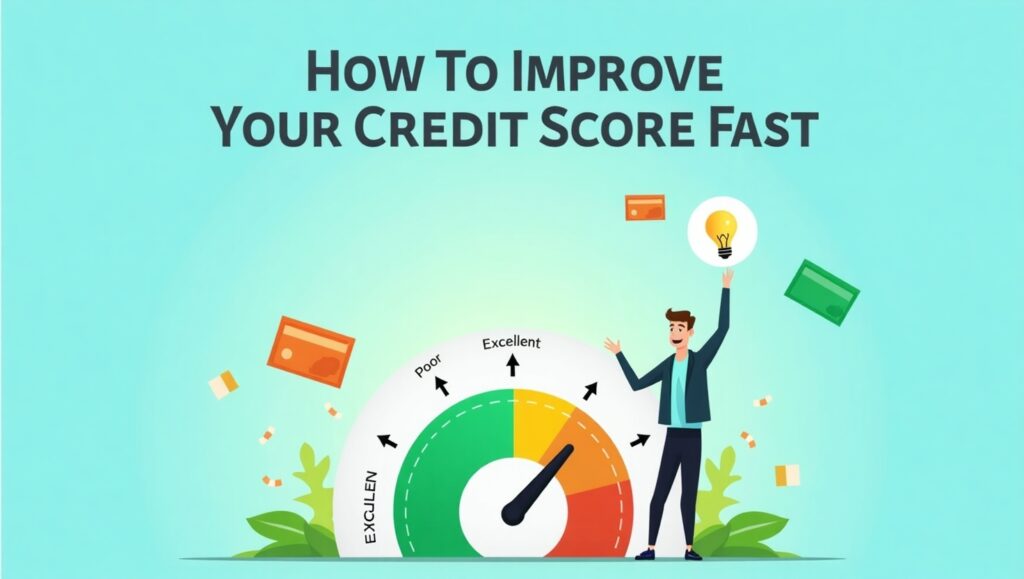Your credit score isn’t just a number — it’s a powerful financial tool. It affects your ability to get approved for loans, credit cards, apartments, and even jobs. The higher your score, the better your chances of getting lower interest rates, higher credit limits, and better financial opportunities.
The good news? You don’t need to wait years to improve your credit score. With the right strategy, you can start seeing results within weeks or months. It’s all about taking smart, focused actions that directly impact how your score is calculated.
Here’s exactly how to improve your credit score fast — no gimmicks, just results.
1. Pay Your Bills On Time — Every Time
Why it matters: Payment history makes up 35% of your credit score. A single missed or late payment can seriously damage your score.
Tip: Set up automatic payments or calendar reminders. If you’re behind, bring your accounts current ASAP — it starts the recovery clock.
2. Reduce Your Credit Card Balances
Why it matters: Your credit utilization ratio (how much credit you use vs. your total limit) should be under 30%, ideally under 10% for faster improvement.
Tip: Pay off high-balance cards first or make multiple payments throughout the month to keep balances low.
3. Request a Credit Limit Increase
Why it matters: Increasing your credit limit can instantly lower your utilization ratio — as long as you don’t increase your spending.
Tip: Ask for a credit limit increase on cards you’ve used responsibly for at least 6 months. Many banks allow you to request it online without a hard inquiry.
4. Check for Credit Report Errors
Why it matters: One in five people has an error on their credit report that may hurt their score. Fixing those can give your score a quick boost.
Tip: Visit AnnualCreditReport.com and check all three bureaus (Experian, Equifax, TransUnion). Dispute any mistakes immediately.
5. Become an Authorized User
Why it matters: If someone with excellent credit adds you as an authorized user, their account history can be added to your report — boosting your score.
Tip: Make sure it’s a card with a long, positive history, low utilization, and on-time payments.
6. Pay Off Collections Strategically
Why it matters: Newer scoring models ignore paid collections, so paying them off can improve your score — especially if you negotiate to have them removed.
Tip: Request a “pay for delete” agreement in writing before paying any collection agency.
7. Don’t Close Old Accounts
Why it matters: The age of your credit history impacts your score. Closing old accounts shortens your credit file and may increase your utilization.
Tip: Keep your oldest credit cards open — even if you rarely use them. Just make a small purchase every few months to keep them active.
8. Diversify Your Credit Mix
Why it matters: Having a mix of credit types (credit cards, auto loans, student loans, etc.) makes up about 10% of your score.
Tip: If you only have credit cards, consider a small credit-builder loan or a secured loan to add diversity — but only if it makes financial sense.
9. Use a Secured Credit Card Wisely
Why it matters: If your credit is poor or limited, a secured card can help you rebuild by reporting on-time payments to the credit bureaus.
Tip: Choose a secured card with no annual fee. Use it for small purchases and pay it off in full each month.
10. Monitor Your Score Regularly
Why it matters: Tracking your score keeps you aware of progress and any sudden changes. It also alerts you to fraud or reporting issues.
Tip: Use free tools like Credit Karma, Credit Sesame, or your bank’s credit monitoring service.
Final Thoughts: Credit Recovery is a Marathon, Not a Sprint
Improving your credit score takes strategy, not luck. While there are no overnight miracles, consistent actions like paying on time, lowering balances, and checking for errors can deliver fast, noticeable results.
Remember: Your credit score is a reflection of your financial habits, not your worth. Start small, stay consistent, and celebrate your progress along the way.
Need help building a custom credit repair plan? I can guide you step-by-step — just ask!


